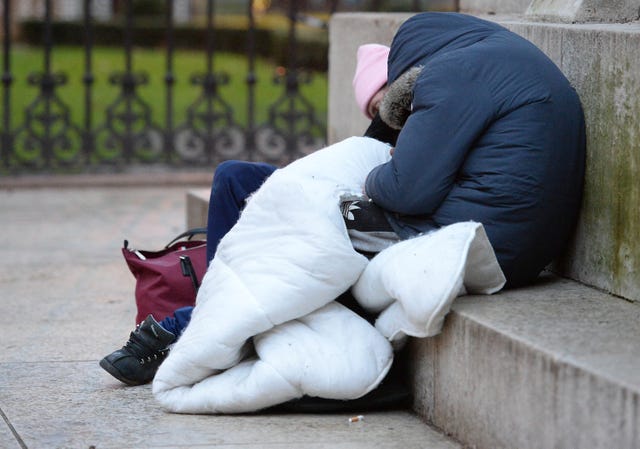The Conservatives have been accused of “abandoning” people to live on the streets as the party failed to honour a pledge to end rough sleeping – instead seeing the number double compared with when the party took power in 2010.
In September 2022, the Government published its Ending Rough Sleeping For Good strategy, which re-stated its 2019 manifesto commitment to end rough sleeping by the end of this parliament.
The strategy committed to “intensify” efforts to tackle homelessness and rough sleeping, stating that an end goal was for “rough sleeping to be prevented wherever possible but when it does occur, it must be rare, brief and non-recurring”.
Friday marked the end of the current parliamentary session – known as prorogation.
The latest available figures, published in February, showed the estimated number of people sleeping rough on a single night in autumn in England in 2023 was 3,898 – more than twice that of the 1,768 figure in 2010.
The charity Crisis described the situation as a “sad reality”, while housing organisation Shelter insisted: “Homelessness is a political choice.”
Polly Neate, Shelter’s chief executive, said: “The Government had five long years to honour its own pledge to end rough sleeping but instead it failed – allowing the number of people sleeping rough to double on its watch and abandoning thousands of people to the trauma of living on the streets.”
Shelter said there had been “decades of failure to build genuinely affordable social homes” and this, combined with record high private rents, had seen an increase in the number of people “forced to sleep in flimsy tents or in sleeping bags on street corners”.

The next government must “prioritise ending homelessness” and avoid “empty promises”, the charity added.
Ms Neate said: “Everyone at risk of street homelessness should be given suitable emergency accommodation and adequate support.
“But the only lasting solution is for all political parties to commit to building genuinely affordable social homes with rents tied to local incomes – we need 90,000 a year for 10 years.”
Matt Downie, chief executive of Crisis, said: “It’s a sad reality that the Government has failed to meet its own target to end rough sleeping.
“It’s a tragedy for people forced to bed down on our streets day in and day out, and it’s also frustrating as we know the solutions exist to end this.
“We need urgent action not only on rough sleeping, but on all forms of homelessness, so that everyone has a safe and secure home.
“The next government must be bold and make ending homelessness a society-wide mission and deliver the social homes and specialist support services needed to make this a reality”.
Emma Haddad, chief executive of St Mungo’s charity, said: “Homelessness is getting worse week on week, month on month.
“But with the right interventions we know it is preventable.
“We urge those elected to treat homelessness as the crisis that it is and make ending it a priority.”
Figures for people living in temporary accommodation – another form of homelessness – have also reached record highs.
Official statistics published last month by the Department for Levelling Up, Housing and Communities (DLUHC) showed the number of overall households in temporary accommodation by the end of last year rose by 12% from 100,510 at the same time in 2022.
The number of those households with children increased by 15% from 61,980.
The total number of children living in temporary accommodation was 145,800 as of December 31, a rise of 15% from 126,340 on the same period in 2022.
Last month, DLUHC said £2.4 billion was being invested over three years to tackle homelessness and to end rough sleeping for good, including £1.2 billion for councils to help people off the streets and into secure housing and £220 million to help fund thousands of beds and specialist support services across the country.
A Conservative Party spokesman said: “Despite the impact of the Covid pandemic and energy price rises following the war in Ukraine, the numbers of people sleeping rough are down by 18% from their peak in 2017 and 9% lower than they were in 2019.
“We are sticking to our bold and clear plan to end homelessness and provide everyone in the country with a more secure future.”




Comments: Our rules
We want our comments to be a lively and valuable part of our community - a place where readers can debate and engage with the most important local issues. The ability to comment on our stories is a privilege, not a right, however, and that privilege may be withdrawn if it is abused or misused.
Please report any comments that break our rules.
Read the rules hereLast Updated:
Report this comment Cancel